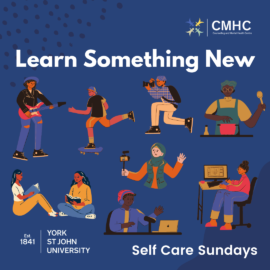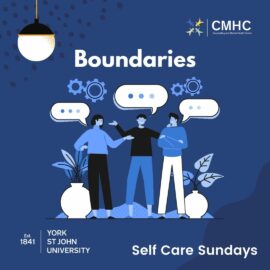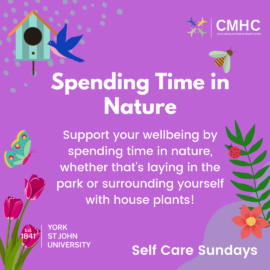In Mondays blog (the start of Self-Care Week), Philipa-Jo discussed how self-care is viewed and approached, a Self-Care Revolution, and shared some definitions of what self-care means. In today’s blog, Philipa-Jo continues exploring what self-care really means to people by speaking to some of York St John University students.
I asked the YSJU community to share what self-care means to them and what steps they take to implement it. Here is what some of you had to say…
“I think self-care means putting your physical and mental health first. It means taking care of your own needs and maintaining a healthy lifestyle and boundaries. I did a self-care to-do list to turn to when I start feeling unproductive and stressed out. I like to take a hot bubble bath, listen to music, DIY,and paint around the house, listen to ASRM, binge watch a tv show, ring a family member or friend, make my own coffee, go for a long walk, and hug my boyfriend and friends a little tighter.” – Kasey, YSJU Undergraduate
“Self-care means taking time out and relaxing to prevent feeling burnt out and stressed. It means I can focus on my mental health and make sure I don’t get stressed or anxious. I do stuff I enjoy such as reading, listening to music and watching TV.” – Victoria, YSJU Undergraduate
“If I’m honest I’m still trying to figure that out myself, I’m working on understanding that self-care/self-kindness is not selfish.” – Kayleigh, YSJU Undergraduate
“It’s very hard to shake off the guilt that self-care time is somehow being selfish, or wasting precious time that I should be busy doing something productive, especially when trying to juggle multiple responsibilities and commitments. Getting up at a similar time each day. Allowing myself time for a quiet cup of coffee before starting the day. Writing achievable to-do lists. Getting outside for a walk. Setting limits on the time I spend on social media. Scheduling in time each week for a hobby or activity I enjoy. All little things that don’t have to cost money but can make a positive difference to how I feel. My mum guilt is awful, however I am a much better parent when I get the balance right. You can’t be your best for anyone else if you are not taking care of yourself.” – Sarah, YSJU Undergraduate
“I think listening to your own body and your own needs is key, with limits. Taking a slow day if you need it. Eat when hungry, stay hydrated, lay in a cosy blanket, play when you feel like it. Take care of the basics first.” – Cheryl, YSJU Undergraduate
When receiving these insights from our YSJU community on their experiences of self-care, not only were there some great tips, but I noticed some key themes on what seemed to affect and help people.
- Check in with yourself, how do you feel? What do you need? Listen to what your body is telling you and take care of the basics first.
- Give yourself permission. It’s ok to have a slow day now and then.
- Remove the guilt… self-care is not self-ish! Remember you cannot be your best for anyone else if you are not first taking care of yourself.
- Self-care does not have to be costly or take a huge time investment. The examples from our YSJU community will hopefully inspire you to explore what self-care means to you, and what you can do to implement it.
Friday will be our last post from Philipa-Jo on self-care where she’ll be looking at why it’s so important, what the potential barriers are for implementing self-care, recognising when self-care is not enough, and how you can start implementing your own self-care regime.
~
Author: Philipa-Jo
~



